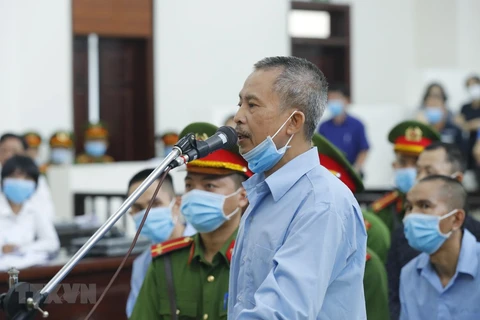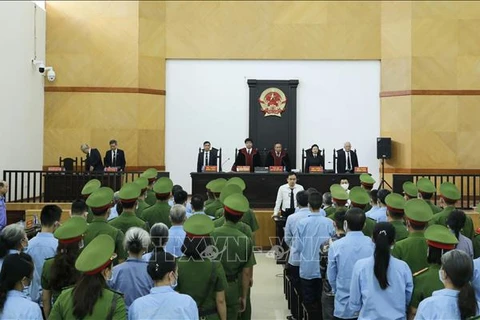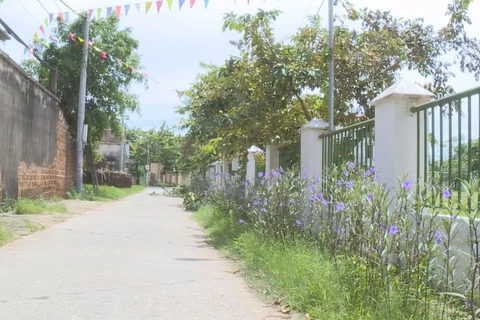Hanoi (VNA) - The week-long first-instance trial of suspects charged with “murder” or “resisting on-duty officers” over a deadly incident in Dong Tam commune in Hanoi’s My Duc district has concluded, with the majority of defendants accepting the sentences they were given.
Their deeds were brutal and inhumane, using petrol to burn to death three policemen who were simply performing their duties.
Correct indictment
The indictment states that six defendants - Le Dinh Cong, Bui Viet Hieu, Nguyen Van Tuyen, Le Dinh Doanh, Le Dinh Chuc, and Nguyen Quoc Tien - were involved in actively preparing means and equipment for the crime, assigned tasks to other defendants, and directly conducted the attacks.
Of the six, Cong was the leader and often incited others to kill police officers by posting video clips and livestreaming on social networks. He also threatened to bomb power stations and kill 300-500 police officers, assigned tasks to other defendants, and actively performed illegal acts.
Meanwhile, Chuc, Cong’s younger brother, poured petrol into the pit where the three policemen had fallen in, and set it on fire, killing them. His act was the most drastic and the direct cause of the death of the policemen, with an obvious motive of murder and showing great aggressiveness and a lack of humanity.
Recognising that there is no possibility of rehabilitation for the duo, the jury gave them both the death penalty.
Meanwhile, Le Dinh Doanh, the son of Chuc, poured petrol into pots and together with Chuc set them on fire before throwing them into the pit, directly causing the death of the three policemen.
His acts were extremely serious and deserving of a severe penalty. As he pleaded guilty and expressed remorse, however, the jury gave him life imprisonment rather than death, to show the humanity and benevolence of the law.
According to the procuracy’s indictment, despite the defendants being well aware that the land at Senh field, near where they lived, was used for defence purposes and was under the management of the Defence Ministry, as confirmed by the Hanoi Inspectorate and the Government Inspectorate in 2013, Kinh (born in 1936 and a resident of Hoanh village) and others set up a “group of consensus” with the aim of re-occupying and dividing the land lot among themselves.
They frequently incited local people to file complaints about Dong Tam administration’s land management and use, used social networks to spread false information that Senh field belongs to Dong Tam commune, and called on local people to “struggle to keep the land”.
In late 2019 and early 2020, upon learning that the Hanoi Department of Public Security coordinated with the air defence - air force service of the Defence Ministry to deploy personnel to protect those building fencing around Mieu Mon airfield on Senh field, Kinh and his accomplices bought weapons with the aim of attacking the force.
In the early hours on January 9, 2020, when police arrived at the gate of Hoanh village, about 50 metres from Kinh’s house, the group used hand-made weapons to attack the officers, causing the three to fall into a pit near Kinh’s house. Chuc and Doanh poured gasoline into the pit and set it on fire, killing the three policemen. At the same time, the authorised force found Kinh holding a grenade and calling upon others to resist those on-duty, and took the decision to shoot him dead.
Law and mercy
After concluding the questioning of the defendants in court, representatives of the People’s Procuracy determined the role and level of crime of each defendant. Applying the criminal code and the clemency policy of the State, representatives of the People’s Procuracy decided to change the charges for 19 defendants from “murder” to “resisting on-duty officers”, meaning their sentences would be reduced.
Furthermore, the representatives proposed that the jury consider lessening the punishment to the lowest level possible, to show the humane policy of the State.
In order to issue decisions, the representatives analysed and considered the specific actions of each defendant as well as their motivation and purpose. The defendants themselves said their understanding of the law was modest, while they received promises from Le Dinh Kinh and followed his directions. They were now aware of their criminality, expressing remorse and cooperating with investigators. None fiercely resisted and all had a relatively low level of engagement in the crimes.
After deliberations, the jury concluded that the majority of the group had the purpose of resisting on-duty officials. Therefore, they agreed with the proposal from the People’s Procuracy on changing the charges and reducing the punishment. Of the 19 defendants, suspended sentences were given to 14, or twice as many as initially proposed by the procuracy.
After the sentences were handed down, Pham Cong Lam, the father of Pham Cong Huy, one of the three policemen killed, agreed with the tolerance shown by the jury. He said the sentences give the defendants a chance to rebuild their lives and become good citizens.
In deciding on the punishment for the six defendants facing the charge of “murder”, the jury carefully considered any extenuating circumstances. Along with reducing the sentence for Doanh, the jury also issued sentences that were less than those proposed by procurators to Bui Viet Hieu, who is over 70 years old and did not directly cause the death of any victim; Nguyen Van Tuyen, who is disabled and was cooperative; and Nguyen Quoc Tien, who did not directly cause the death of the policemen, expressed remorse, and cooperated with investigators.
Conscience awakened
Most of the defendants expressed a deep sense of regret and apologised to the families of the three policemen. Some said they had little understanding of the law and were enticed to commit crimes. They are now aware that their crimes were clear and indisputable and no further investigations were needed. They also promised to improve themselves and never commit a crime again.
Defendant Bui Thi Duc pled guilty and asked for forgiveness. She vowed to never commit a crime again.
Meanwhile, Le Dinh Quan admitted his guilt and sought clemency.
Like Quan, defendants Nguyen Thi Bet, Mai Thi Phan, Nguyen Van Tuyen, and Bui Van Nien were repentant and apologised to the victim’s families. They expressed a hope for clemency, so that they may return to their families and raise their children to be good citizens.
Justice was observed. It was manifested not only by the correct punishment being meted out but also by an awakening of the defendants’ consciences. Not only recognising their wrongdoings, they were awakened inside about the difference between right and wrong, which motivates them to fix their mistakes.
For them, the most important thing is to see the right way ahead./.
VNA
























